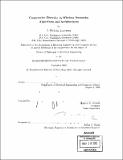Cooperative diversity in wireless networks : algorithms and architectures
Author(s)
Laneman, J. Nicholas
DownloadFull printable version (9.544Mb)
Other Contributors
Massachusetts Institute of Technology. Dept. of Electrical Engineering and Computer Science.
Advisor
Gregory W Wornell.
Terms of use
Metadata
Show full item recordAbstract
To effectively combat multipath fading across multiple protocol layers in wireless networks, this dissertation develops energy-efficient algorithms that employ certain kinds of cooperation among terminals, and illustrates how one might incorporate these algorithms into various network architectures. In these techniques, sets of terminals relay signals for each other to create a virtual antenna array, trading off the costs-in power, bandwidth, and complexity-for the greater benefits gained by exploiting spatial diversity in the channel. By contrast, classical network architectures only employ point-to-point transmission and thus forego these benefits. After summarizing a model for the wireless channel, we present various practical cooperative diversity algorithms based upon different types of relay processing and re-encoding, both with and without limited feedback from the ultimate receivers. Using information theoretic tools, we show that all these algorithms can achieve full spatial diversity, as if each terminal had as many transmit antennas as the entire set of cooperating terminals. Such diversity gains translate into greatly improved robustness to fading for the same transmit power, or substantially reduced transmit power for the same level of performance. For example, with two cooperating terminals, power savings as much as 12 dB (a factor of sixteen) are possible for outage probabilities around one in a thousand. Finally, we discuss how the required level of complexity in the terminals makes different algorithms suitable for particular network architectures that arise in, for example, current cellular and ad-hoc networks.
Description
Thesis (Ph. D.)--Massachusetts Institute of Technology, Dept. of Electrical Engineering and Computer Science, 2002. Includes bibliographical references (p. 179-187).
Date issued
2002Department
Massachusetts Institute of Technology. Department of Electrical Engineering and Computer SciencePublisher
Massachusetts Institute of Technology
Keywords
Electrical Engineering and Computer Science.